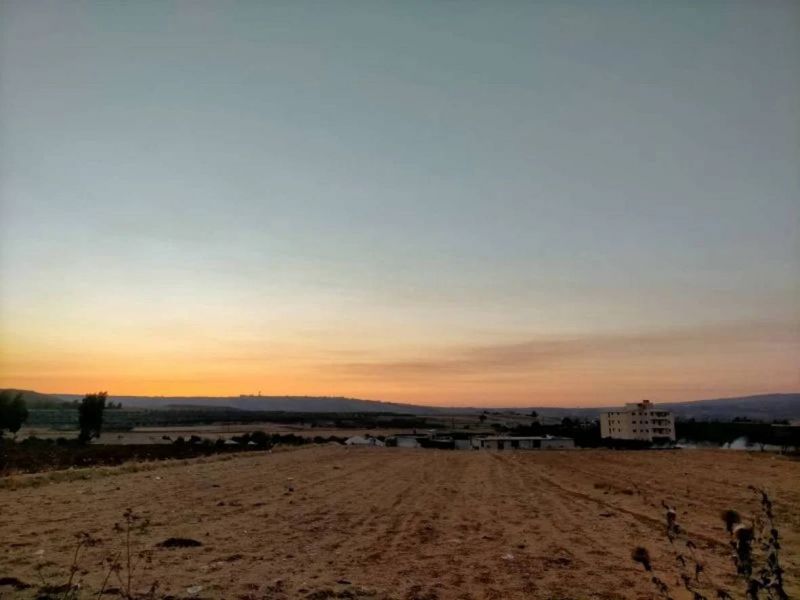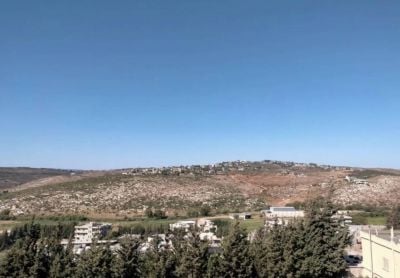
A view of Wadi Khaled with Syria on the horizon. (Credit: Emmanuel Haddad)
Last month, in a flat in Homs’ Umm Jameh village, Mohammad* waited until nightfall to cross the Wadi Khaled river and take refuge in Lebanon. Aged 18, the young man from Hama had two good reasons for fleeing Syria.
“Firstly, there’s conscription, which lasts several years, when you risk being killed,” he said from the Akkar spice shop where he now works. “Then, a few months ago, a shabiha [thug] stabbed me and I reported him to the police. He is going to be out soon and my parents are afraid for my life.”
He points to a thick scar running down his back.
Every day, dozens of people attempt to flee Syria illegally through a well-oiled network of smugglers. Despite the fact that it is commonplace at the border, human trafficking has its darker side. Several Syrians recently crossed the border and agreed to speak on condition of anonymity, reporting degrading violence, from kidnapping to sexual assault, all at the hands of smugglers and regime shabihas acting with the complicity of the Syrian army and Lebanese smugglers.
Mohammad had no idea that, to escape death, he would have to come so close to it.
“I had paid $50 for a ‘military line’ crossing. But there were 65 of us in the van leaving Hama, piled on top of each other like cattle,” he recounted. “Once we arrived, another car dropped us off at the mountain and a Syrian smuggler told us to walk. But soldiers from the Lebanese army fired at us. We had to hide for two hours before arriving at Wadi Khaled, where another smuggler took us on foot around the Shadra checkpoint.”
He denounced both the lies and the violence suffered during the Syrian journey. “The smugglers,” he said, “don’t even fear God.”
Well-protected big shots
According to Samira,* a Syrian human rights activist who has taken refuge in Akkar, who herself has smugglers in her family in Wadi Khaled, there is one person who scares them: Shoujaa al-Ali, a shabiha from Hadida, not far from Umm Jameh. It is from this village that Ali regularly kidnaps Syrians on their way to Lebanon.
“With his armed men, he stops the vans as if at a checkpoint, then takes the passengers to his place. Then the van driver tells their relatives one by one, demanding a ransom of $15,000 to free them.”
Samira knows all about it: her sister-in-law recently fell victim to this criminal racket. Having relatives who are smugglers, she asked them to negotiate her release and was astonished to discover that they feared Ali:
“He is capable of putting an end to their business by kidnapping more and more of their ‘customers’,” she said
In the end, Samira’s sister-in-law was released for a ransom of $4,000. She recalled her surprise upon learning that a Lebanese smuggler known as Abu Jhaish had handed her over to her family in Wadi Khaled.
“I then discovered that he was Shoujaa al-Ali’s partner in Lebanon. One of the border crossings even bears his name,” she said. When asked about this “big shot,” the Lebanese army spokesman, General Elie Mezher, said that “he may be living on the Syrian side,” but that he had “no information on this subject.”
There is no doubt in Samira’s mind that if Shoujaa al-Ali and his accomplices operate freely, it is because they are supported by the Syrian army’s powerful 4th armored division, led by the Syrian president’s brother, Maher al-Assad, who oversees the Syrian production and distribution of captagon. Several refugees interviewed by L’Orient-Le Jour have confirmed the presence of Maher al-Assad’s forces on the border with Wadi Khaled and their involvement in human trafficking.
The ordeal of one of the displaced, Naïm,* began in Selaata where, on Jan.1, 2023, after an unsuccessful attempt to reach Italy by sea, the Lebanese army took him and some 200 other Syrians to Wadi Khaled.
After confiscating to would-be migrants’ phones and papers, the Lebanese soldiers handed them over to armed men who took them across Nahr al-Kabir and held them in an agricultural greenhouse, where children with telephones approached them. If the Syrians had no money on them, they asked for their relatives’ numbers so that they could pay for their release. Naïm had set aside 300 euro for his arrival in Italy.
“Soldiers from the 4th division arrived with a notebook and started writing down the price for each person. I ended up negotiating my release for 250 euros. Then a smuggler took me across the river in the other direction.”
He also bears the scars of his traveling companions’ ordeal. “A 17-year-old girl was sexually assaulted in front of us by one of the Lebanese smugglers waiting for us on the other side,” he said.
Principle of non-repatriation
According to lawyer Mohammad Sablouh, who defends the rights of Syrians in Lebanon, the smugglers working with the 4th division in Lebanon are part of the Abu Jhaish group. General Mezher said he had “heard of the presence of the 4th division” at the border, but can “neither deny nor confirm” this information.
Naïm’s story is not an isolated one. According to a report by Access Center for Human Rights, during army operations to expel Syrian refugees between April and June 2023, 82 Syrians were handed over to the 4th division at the Lebanese-Syrian border, some of whom were registered as refugees with the UNHCR. “The UNHCR does not have access to or monitor the border,” said Lisa Khaled, spokesperson for the agency in Lebanon. “Access to security and the principle of non-repatriation are cornerstones of refugee protection.”
On Sept. 6, caretaker Lebanese Foreign Affairs Minister Abdallah Bou Habib called on the Arab League to “help Syria overcome its political and economic crisis,” which he said was at the root of the rise in the number of Syrian refugees in Lebanon, and warned of “more dangerous repercussions than some could imagine” for neighboring countries.
Meanwhile, at the border, Syrians continue to risk their lives at the hands of unscrupulous smugglers. On Sept. 13, a young man of 18 was killed and two others got injured in a mine explosion.
“According to sources I have,” said Samira, “they were used by Abu Jhaish to open up a new route.”
* First names have been changed for security reasons.
This story first ran in French in L’Orient-Le Jour, translated by Joelle Khoury.
